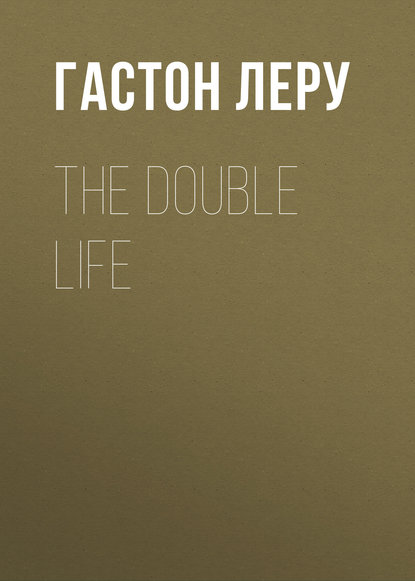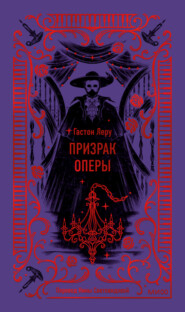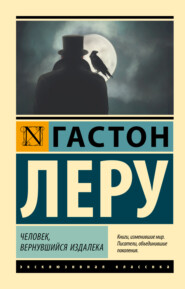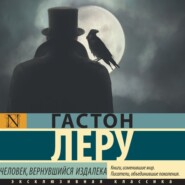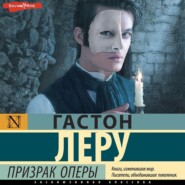По всем вопросам обращайтесь на: info@litportal.ru
(©) 2003-2025.
✖
The Double Life
Автор
Год написания книги
2018
Настройки чтения
Размер шрифта
Высота строк
Поля
WHEN M. Longuet had recovered from the emotion that M. Mifroid’s explanation of the train had caused him, he went through his pockets and handed over to M. Mifroid a revolver and a large knife that he had found in Signor Petito’s pocket.
He was now perfectly rational and felt free from the influences of Cartouche. He, however, dreaded the return of these fancies, and asked M. Mifroid to accept these articles in order to defend himself should he again be possessed with this evil spirit.
Continuing the search through his pockets, he produced seven lamps like those of M. Mifroid, and so between them they had thirteen of these lights, which would give them 520 hours of continuous light. They, however, worked out that they could do ten hours a day without light on account of sleep, and their calculations gave them fourteen hours of light per day.
“M. Longuet,” said M. Mifroid, “you are wonderful. Cartouche himself could not have done better; but what is the good of carrying them around with us? They will only be a nuisance. Are you hungry, M. Longuet? How long do you think you could remain without food?”
“I am sure,” he declared, “that I could remain this way forty-eight hours.”
“Well, you will have to remain like this for seven days, perhaps. I will throw these ten lamps away, as after the third one I am afraid we shall not have much need of the rest.”
“Where are you going?” asked M. Longuet. “No matter where,” answered his companion; “but we must go anywhere rather than stay here, for there is not a ray of hope here. We will reflect while walking. Walking is our only salvation, but by walking seven days we will risk all chance of arriving anywhere, unless we make a plan.” “Why not make an exact plan?” asked M. Longuet.
“Because I have observed in all the stories of the catacombs there were always marked plans which the unfortunate wanderers have lost. They were confused by the marked places, and not understanding anything about it, they became overwhelmed with despair. In our situation it is necessary to shun all causes for despair. You are not without hope, M. Longuet?”
“Oh, by no means, M. Mifroid. I will add, even, that were I not so hungry, your pleasant society aiding, I should not at all regret the roofs of the Rue Gerondo. You must tell me some stories of the catacombs, M. Mifroid, to let me forget my hunger.”
“Why, certainly, my friend. There is the story of the ‘Jailer,’ and the story of the ‘Four Soldiers.’”
“With which will you begin?”
“I am first going to tell you of the catacombs in general; this will make you understand why it is necessary to walk a long time to get out of them.”
Here M. Longuet interrupted him, asking why in ending his sentences he always made a gesture with the thumb of his right hand.
“That means, M. le Commissioner, that the gesture has become a habit with you-putting on thumb-screws?”
M. Mifroid declared that that was not the reason. He often gave himself up to sculpture, and he explained to him that it was the habit of a modeler. He buried his hand in his discoveries, just as he did in his clay.”
M. Longuet expressed astonishment that a police commissioner should interest himself in sculpture. However, it afterward transpired that M. Mifroid’s knowledge of this art was the means of their final escape from the catacombs.
M. Mifroid, in reporting, the events of the catacombs, wrote as follows:
“The way that we were following was a vast passage of four or five meters high. The walls were very dry, and the electric light which lit our way allowed us to see a hard stone, devoid of all vegetation, even of moisture. That proof was not one to rejoice M. Longuet’s heart, for he was beginning to be very thirsty. I knew that in the catacombs there were some threads of running water. I thanked heaven for not putting us on one of these threadlike streams, for we should only have lost time in imbibing there, and, moreover, as we could not carry away any water, it would only have made us more thirsty.
“M. Longuet objected to the idea that we were walking without caring where. I resolved to make him understand the necessity of walking on anywhere, in relating to him that which was the truth, that the engineers, when repairing the track, had descended into the catacombs, and had sought in vain to discover their limits, and to find an outlet they were obliged to give it up, and they built those pillars as supports, and built the arch with masons’ materials; they descended directly into the hole, before closing it finally over our heads. Not to discourage M. Longuet, I informed him that, to my knowledge, we could count on at least 520 kilometers of catacombs, but there was not a single reason why they should not have had more. Evidently, if I had not warned him immediately of the difficulty of getting out of there, he would have manifested his despair the second day of the walk.
“‘I think, then,’ I said to him, ‘that they have dug this soil from the third to the seventeenth century. For during 1400 years, man had removed from under the soil the materials that were necessary to construct above. If at any time there was not enough above, there was always more below. That above returns below, and goes out thence,’ and as we still found ourselves under the ancient Quarter d’Enfer, I recalled to him that in 1777 a house in the Rue d’Enfer was swallowed up by the earth below. It was precipitated to 28 meters below the soil in its court. Some months later, in 1778, seven persons met death in a similar caving in. I cited still several more recent examples, dwelling upon the accident to persons. He understood, and said to me: ‘In short, it is often more dangerous to walk above than below.’
“I kept on, seeing that he was impressed, and he spoke no more of his hunger, and forgot his thirst. I profited by it to make him lengthen his step, and I burst into the most entrancing song which came into my mind. He took it up, and we sang in chorus:
“‘Au pas, comerade, au pas,
La route est belle!
J’aura du frictiti la bas,
Dans la gamelle!’
“It was this which made him keep step.
“One gets tired of singing very quickly in the catacombs, because the voice does not carry; so when we had got tired M. Longuet asked a hundred more questions. He asked me how many meters there were over our heads. I told him that that could vary, from the latest reports, from 5m.82 and 79 meters. Sometimes, I told him, the crust of earth was so thin that it was necessary to extend the foundations of the tombs as far as the bottom of the catacombs. So that we might, in the course of our peregrinations, encounter the pillars of Saint Sulpice de St. Etienne du Mont, of the Pantheon of the Val de Grace, of the Odeon. These monuments are erected in some way on the subterranean pilings.
“‘Really, in the course of our peregrinations we risk encountering some of these subterranean pilings.’ But he had his own fixed idea.
“‘And in the course of our peregrinations, is there any chance of our coming upon an exit? Are there many ways out of the catacombs?’
“‘There are not,’ I replied; ‘there is need of them. First of all, there are egresses into the quarter.’
“‘So much the better,’ he interrupted.
“‘And other ways out that some know of, but by which none are ever admitted, but which exist, nevertheless, in the caves of the Pantheon, in those of the College of Henry IV, of the Hospital of the Undi, of some houses in the Rue d’Enfer, of Vangirard, of the Tombe Issoire at Passy, at Chaillot, at Saint Maur, at Clarenton, at Gentilly-more than sixty. In order to safeguard building construction, an ordinance was made which closed all the openings to the catacombs.
It is that ordinance, my dear M. Longuet, which has almost walled us in.’
“At that moment we struck an enormous pillar. I examined its construction, and said without stopping: ‘Here is a pillar which was used by the architects of Louis XVI in 1778, then of the Consolidation.’
“‘Poor Louis XVI!’ said M. Longuet. ‘He had better have consolidated royalty.’
“M. Longuet had taken the electric lamp from my hands, and did not cease to throw the rays to the right and left, as if he was looking for something. I asked him the reason of this, which would fatigue the eyes.
“‘I am looking for some corpses,’ he said.
“‘Some corpses!’
“‘Skeletons. I have heard that the walls of the catacombs are hung with skeletons.’
“‘Oh, my friend’-I already called him friend, his serenity in such a serious emergency delighting me so much-’that ghastly tapestry is only a little longer than a kilometer. That kilometer justly called an ossuary, on account of the skulls, the radius, the cubitus, tibias, shin-bones, phalanges, the thorax, and other small bones which were made into unique ornaments. But what ornaments! Ornaments of three million skeletons, that were brought from the cemeteries and acropolis of Saint Midard Clucy, Saint Lamdry of the Carmelites, the Benedictines, and of the Innocents.
“‘All bones, the little bones well sorted, arranged, co-ordinated, classified, labeled, which made on the walls and in the cross passages, roses, parallelopipides, triangles, rectangles, volutes, crevices, and many other figures of marvelous regularity.
“‘Let us wish, my friend, to reach that domain of the dead. It will be life. For there there are always a number of people. It is much frequented. But we are not there. What is one kilometer of dead men’s bones in five hundred?’
“‘Clearly! How many kilometers do you think we have made, M. Mifroid?’
“‘We have made nine.’
“‘What are nine kilometers in five hundred?’
“I induced M. Longuet not to make these useless calculations, and he begged me to tell him the story of the ‘Jailer’ and that of the ‘Four Soldiers.’
“That made two histories which were not very long in telling. There were only a few words in the first. There was once a jailer of the catacombs who became lost in the catacombs. They found his corpse eight days later. The second related to four soldiers of the Val-de-Graces, who were descending, by the aid of a cord, into a well of eighty meters. They were in the catacombs, and as they did not reappear some drummers were sent down, who made the greatest noise that they could with their drums, but in the catacombs sound does not carry, and no one responded to the rolling. They hunted, and at the end of forty hours they found them dying in a blind alley.
“‘They had no moral courage,’ said Théophraste.
“‘They were foolish,’ I added. ‘Whoever is foolish enough to wander into the catacombs deserves no pity.’
“We were by this time come to a crossway, and M. Longuet turned to ask which way we would follow.
“I could answer him without delay. I said:
“‘Here are two galleries; which are you going to take? One goes almost directly back to our starting-point, the other directly away from it.’ As our design was to go away from our starting-point, M. Longuet showed me the first gallery.
He was now perfectly rational and felt free from the influences of Cartouche. He, however, dreaded the return of these fancies, and asked M. Mifroid to accept these articles in order to defend himself should he again be possessed with this evil spirit.
Continuing the search through his pockets, he produced seven lamps like those of M. Mifroid, and so between them they had thirteen of these lights, which would give them 520 hours of continuous light. They, however, worked out that they could do ten hours a day without light on account of sleep, and their calculations gave them fourteen hours of light per day.
“M. Longuet,” said M. Mifroid, “you are wonderful. Cartouche himself could not have done better; but what is the good of carrying them around with us? They will only be a nuisance. Are you hungry, M. Longuet? How long do you think you could remain without food?”
“I am sure,” he declared, “that I could remain this way forty-eight hours.”
“Well, you will have to remain like this for seven days, perhaps. I will throw these ten lamps away, as after the third one I am afraid we shall not have much need of the rest.”
“Where are you going?” asked M. Longuet. “No matter where,” answered his companion; “but we must go anywhere rather than stay here, for there is not a ray of hope here. We will reflect while walking. Walking is our only salvation, but by walking seven days we will risk all chance of arriving anywhere, unless we make a plan.” “Why not make an exact plan?” asked M. Longuet.
“Because I have observed in all the stories of the catacombs there were always marked plans which the unfortunate wanderers have lost. They were confused by the marked places, and not understanding anything about it, they became overwhelmed with despair. In our situation it is necessary to shun all causes for despair. You are not without hope, M. Longuet?”
“Oh, by no means, M. Mifroid. I will add, even, that were I not so hungry, your pleasant society aiding, I should not at all regret the roofs of the Rue Gerondo. You must tell me some stories of the catacombs, M. Mifroid, to let me forget my hunger.”
“Why, certainly, my friend. There is the story of the ‘Jailer,’ and the story of the ‘Four Soldiers.’”
“With which will you begin?”
“I am first going to tell you of the catacombs in general; this will make you understand why it is necessary to walk a long time to get out of them.”
Here M. Longuet interrupted him, asking why in ending his sentences he always made a gesture with the thumb of his right hand.
“That means, M. le Commissioner, that the gesture has become a habit with you-putting on thumb-screws?”
M. Mifroid declared that that was not the reason. He often gave himself up to sculpture, and he explained to him that it was the habit of a modeler. He buried his hand in his discoveries, just as he did in his clay.”
M. Longuet expressed astonishment that a police commissioner should interest himself in sculpture. However, it afterward transpired that M. Mifroid’s knowledge of this art was the means of their final escape from the catacombs.
M. Mifroid, in reporting, the events of the catacombs, wrote as follows:
“The way that we were following was a vast passage of four or five meters high. The walls were very dry, and the electric light which lit our way allowed us to see a hard stone, devoid of all vegetation, even of moisture. That proof was not one to rejoice M. Longuet’s heart, for he was beginning to be very thirsty. I knew that in the catacombs there were some threads of running water. I thanked heaven for not putting us on one of these threadlike streams, for we should only have lost time in imbibing there, and, moreover, as we could not carry away any water, it would only have made us more thirsty.
“M. Longuet objected to the idea that we were walking without caring where. I resolved to make him understand the necessity of walking on anywhere, in relating to him that which was the truth, that the engineers, when repairing the track, had descended into the catacombs, and had sought in vain to discover their limits, and to find an outlet they were obliged to give it up, and they built those pillars as supports, and built the arch with masons’ materials; they descended directly into the hole, before closing it finally over our heads. Not to discourage M. Longuet, I informed him that, to my knowledge, we could count on at least 520 kilometers of catacombs, but there was not a single reason why they should not have had more. Evidently, if I had not warned him immediately of the difficulty of getting out of there, he would have manifested his despair the second day of the walk.
“‘I think, then,’ I said to him, ‘that they have dug this soil from the third to the seventeenth century. For during 1400 years, man had removed from under the soil the materials that were necessary to construct above. If at any time there was not enough above, there was always more below. That above returns below, and goes out thence,’ and as we still found ourselves under the ancient Quarter d’Enfer, I recalled to him that in 1777 a house in the Rue d’Enfer was swallowed up by the earth below. It was precipitated to 28 meters below the soil in its court. Some months later, in 1778, seven persons met death in a similar caving in. I cited still several more recent examples, dwelling upon the accident to persons. He understood, and said to me: ‘In short, it is often more dangerous to walk above than below.’
“I kept on, seeing that he was impressed, and he spoke no more of his hunger, and forgot his thirst. I profited by it to make him lengthen his step, and I burst into the most entrancing song which came into my mind. He took it up, and we sang in chorus:
“‘Au pas, comerade, au pas,
La route est belle!
J’aura du frictiti la bas,
Dans la gamelle!’
“It was this which made him keep step.
“One gets tired of singing very quickly in the catacombs, because the voice does not carry; so when we had got tired M. Longuet asked a hundred more questions. He asked me how many meters there were over our heads. I told him that that could vary, from the latest reports, from 5m.82 and 79 meters. Sometimes, I told him, the crust of earth was so thin that it was necessary to extend the foundations of the tombs as far as the bottom of the catacombs. So that we might, in the course of our peregrinations, encounter the pillars of Saint Sulpice de St. Etienne du Mont, of the Pantheon of the Val de Grace, of the Odeon. These monuments are erected in some way on the subterranean pilings.
“‘Really, in the course of our peregrinations we risk encountering some of these subterranean pilings.’ But he had his own fixed idea.
“‘And in the course of our peregrinations, is there any chance of our coming upon an exit? Are there many ways out of the catacombs?’
“‘There are not,’ I replied; ‘there is need of them. First of all, there are egresses into the quarter.’
“‘So much the better,’ he interrupted.
“‘And other ways out that some know of, but by which none are ever admitted, but which exist, nevertheless, in the caves of the Pantheon, in those of the College of Henry IV, of the Hospital of the Undi, of some houses in the Rue d’Enfer, of Vangirard, of the Tombe Issoire at Passy, at Chaillot, at Saint Maur, at Clarenton, at Gentilly-more than sixty. In order to safeguard building construction, an ordinance was made which closed all the openings to the catacombs.
It is that ordinance, my dear M. Longuet, which has almost walled us in.’
“At that moment we struck an enormous pillar. I examined its construction, and said without stopping: ‘Here is a pillar which was used by the architects of Louis XVI in 1778, then of the Consolidation.’
“‘Poor Louis XVI!’ said M. Longuet. ‘He had better have consolidated royalty.’
“M. Longuet had taken the electric lamp from my hands, and did not cease to throw the rays to the right and left, as if he was looking for something. I asked him the reason of this, which would fatigue the eyes.
“‘I am looking for some corpses,’ he said.
“‘Some corpses!’
“‘Skeletons. I have heard that the walls of the catacombs are hung with skeletons.’
“‘Oh, my friend’-I already called him friend, his serenity in such a serious emergency delighting me so much-’that ghastly tapestry is only a little longer than a kilometer. That kilometer justly called an ossuary, on account of the skulls, the radius, the cubitus, tibias, shin-bones, phalanges, the thorax, and other small bones which were made into unique ornaments. But what ornaments! Ornaments of three million skeletons, that were brought from the cemeteries and acropolis of Saint Midard Clucy, Saint Lamdry of the Carmelites, the Benedictines, and of the Innocents.
“‘All bones, the little bones well sorted, arranged, co-ordinated, classified, labeled, which made on the walls and in the cross passages, roses, parallelopipides, triangles, rectangles, volutes, crevices, and many other figures of marvelous regularity.
“‘Let us wish, my friend, to reach that domain of the dead. It will be life. For there there are always a number of people. It is much frequented. But we are not there. What is one kilometer of dead men’s bones in five hundred?’
“‘Clearly! How many kilometers do you think we have made, M. Mifroid?’
“‘We have made nine.’
“‘What are nine kilometers in five hundred?’
“I induced M. Longuet not to make these useless calculations, and he begged me to tell him the story of the ‘Jailer’ and that of the ‘Four Soldiers.’
“That made two histories which were not very long in telling. There were only a few words in the first. There was once a jailer of the catacombs who became lost in the catacombs. They found his corpse eight days later. The second related to four soldiers of the Val-de-Graces, who were descending, by the aid of a cord, into a well of eighty meters. They were in the catacombs, and as they did not reappear some drummers were sent down, who made the greatest noise that they could with their drums, but in the catacombs sound does not carry, and no one responded to the rolling. They hunted, and at the end of forty hours they found them dying in a blind alley.
“‘They had no moral courage,’ said Théophraste.
“‘They were foolish,’ I added. ‘Whoever is foolish enough to wander into the catacombs deserves no pity.’
“We were by this time come to a crossway, and M. Longuet turned to ask which way we would follow.
“I could answer him without delay. I said:
“‘Here are two galleries; which are you going to take? One goes almost directly back to our starting-point, the other directly away from it.’ As our design was to go away from our starting-point, M. Longuet showed me the first gallery.





